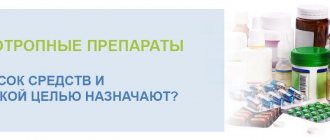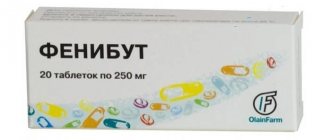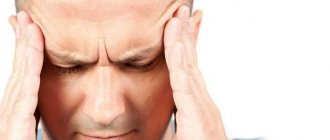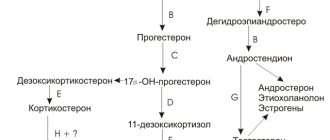Sleep disorder, restlessness, increased anxiety, irritability, emotional instability, high fatigue - familiar phrases for a modern person who often faces psycho-emotional stress and stress. When these and similar conditions affect the quality of life, the attending physician may prescribe Phenibut, a nootropic medicine that improves cognitive abilities and has a mild tranquilizing effect. This combination allows you to simultaneously maintain performance and eliminate anxiety.
Phenibut is good for people who often experience anxiety and restlessness.
Indications
Phenibut can be used once to prevent motion sickness and for the purpose of premedication for anesthesia.
The active ingredient of the drug, aminophenylbutyric acid, is a derivative of phenylethylamine and gamma-aminobutyric acid (GABA). Moreover, GABA is an organic compound, a brain metabolite, that is, a substance that is used by the structures of the central nervous system to ensure metabolism and maintain the effective functioning of brain cells.
Phenibut is prescribed by your doctor to treat the following conditions or diseases:
- asthenic state (lethargy, apathy, feeling of exhaustion, fatigue, etc.);
- anxiety-neurotic conditions;
- constant incessant anxiety for various reasons;
- feeling of fear;
- feeling of anxiety;
- insomnia, nighttime restlessness and nightmares in older people;
- obsessive-compulsive neurosis;
- psychopathy;
- with strong anxiety before surgery or any other invasive diagnostic procedure;
- Meniere's disease and other pathologies of the vestibular apparatus caused by injuries, vascular and other disorders;
- otogenic labyrinthitis;
- dizziness caused by dysfunction of the vestibular apparatus;
- prevention of motion sickness;
- stuttering in children;
- tics of various origins in children;
- enuresis in children;
- alcohol withdrawal syndrome (in combination with other drugs);
- preliminary state in alcoholism;
- to enhance the effect of antiparkinsonian drugs.
Anvifen is there, no worries
Elena Bystrova
- Irina Vladimirovna, have you encountered mysterious cases in your practice when patients complained of somatic symptoms, but studies did not reveal serious health problems?
– There is no mystery in this. Indeed, neurology has well described disorders in the development of which a psychogenic factor plays a leading role. They are united by a common term - “vegetative dystonia syndrome”. Typically, people suffering from this syndrome complain of severe headaches, dizziness, dyspeptic disorders, insomnia, depression, memory impairment, high blood pressure, etc. But behind the somatic complaints lie emotional and affective disorders: anxiety, depressive, hypochondriacal. The main risk factor for the development of such a syndrome is the presence of long-term stress. Moreover, we mean both exogenous stresses that arise under the influence of external factors, and endogenous, internal ones. For example, pain itself is also a stress factor. It triggers a chain of compensatory reactions and, in case of insufficiency of adaptive mechanisms, becomes chronic. If a person is unable to adequately withstand stress, a breakdown occurs and anxiety-neurotic disorders arise.
The main risk factor for the development of autonomic dystonia syndrome is the presence of long-term stress.
– Does the tendency to such disorders depend on the psychological make-up of the individual?
- Of course. At risk are suspicious, anxious, impressionable people. Lifestyle also matters a lot - in particular, physical inactivity and bad habits. In addition, as a rule, autonomic imbalance is based on hereditary dysfunction of the autonomic centers of the brain. In addition, the causes of disorders are excessive physical exertion, emotional shock and, of course, diseases: neurological, mental, endocrine, infectious, traumatic brain injury, etc.
– What is the main symptom of most anxiety-neurotic disorders?
– Most patients complain of chronic tension-type headache (CTH). It is this that is regarded as a complex psychophysiological phenomenon, the prevalence of which in adults in our country exceeds 30%. That is, every third person suffers from this symptom. As a rule, it affects people whose lives are associated with frequent stressful situations, which, alas, is not uncommon these days. TTH is not only a medical, but also a social problem, as it reduces performance by 25% and significantly increases the risk of developing anxiety and depression.
– Why do people facing chronic headaches rarely turn to doctors for help, but prefer to treat themselves?
“Unfortunately, either doctors treat their complaints with inattention, or therapy for many years does not bring results. Such patients are usually given diagnoses such as “cervicocranialgia caused by cervical osteochondrosis”, “cerebral vasospasm”, “hypertension of the 1st degree”, “vegetative-vascular dystonia” and “dyscirculatory encephalopathy” in the elderly. They are prescribed chondroprotectors, nootropics, vitamins, muscle relaxants, but these drugs do not have a pronounced effect. Then patients have no choice but to put up with daily headaches and uncontrollably take analgesics.
– What therapy will be effective?
– It has been proven that the leading role in the development of such diseases belongs to stress, which leads to the depletion of the body’s neurotransmitter systems, namely the GABAergic system.
The GABAergic system performs a protective function - it has an inhibitory effect, limits the influence of stress factors on the body. But as a result of prolonged and constant exposure to stress, the GABAergic system is depleted, and it ceases to perform its protective function. It is at this moment that conditions are created for the development of the somatic symptoms described above. And therefore, in treatment, it makes sense to use GABAergic drugs that help the body compensate for the deficiency of GABA (gamma-aminobutyric acid) and adapt to stress. may be one of the drugs of choice for such disorders .
The active ingredient of the drug is aminophenylbutyric acid hydrochloride, a derivative of the natural neurotransmitter GABA. Anvifen belongs to the class of daytime anxiolytics that have vegetative-stabilizing and nootropic effects. Anvifen has proven itself in the treatment of anxiety-neurotic disorders, chronic tension headaches and other manifestations of autonomic dystonia syndrome. The drug effectively eliminates anxiety, normalizes sleep, and does not cause drowsiness or muscle relaxation - that is, it is a daytime anxiolytic and stress protector. At the same time, Anvifen is suitable for both young patients and elderly people. The drug has a minimal number of side effects (in particular, it is safe for the gastrointestinal tract) and is well tolerated. By the way, only Anvifen has a unique children’s dosage - 50 mg capsules. This allows it to be prescribed to children from 3 years of age for the treatment of asthenic and anxiety-neurotic conditions, as well as in the complex treatment of stuttering, tics and enuresis.
Contraindications
Phenibut is contraindicated during pregnancy
Despite the positive effect on the body and an impressive list of indications, the use of Phenibut may be limited. So, it is contraindicated in the following cases:
- individual sensitivity or intolerance to the components of the drug;
- pregnancy and breastfeeding;
- liver failure;
- erosions and ulcers of the gastrointestinal tract.
How to take Phenibut
Phenibut is prescribed in therapeutic courses lasting from 2-3 to 4-6 weeks, depending on the disease and the speed of normalization of the condition. Therapy can be repeated after 2-4 weeks. This time interval is necessary so as not to cause addiction to the drug, which supplies the brain with the necessary metabolites, and it (the brain) stops producing these substances on its own in the required quantities.
Phenibut is started at full therapeutic dosage. But they stop the course of treatment gradually, reducing the dosage over 1-2 weeks.
With long-term use of Phenibut, it is recommended to take a general blood test once a week to identify possible eosinophilia and a blood test for the activity of AST and ALT.
When using Phenibut with other psychotropic drugs, it is necessary to reduce the dosage of both medications taken.
If a person gets motion sickness in transport, then Phenibut should be taken 20-30 minutes before the trip in a single dose of 250-500 mg (1-2 tablets). Only in this case will it be effective.
Take Phenibut tablets with plenty of water.
Phenibut should only be taken after meals, as severe irritation of the stomach lining may occur. The tablet must be swallowed whole, without biting or chewing, or crushing in any other way. The tablets should be taken with plenty of water.
Standard dosage of Phenibut for adults: 250 – 500 mg (1-2 tablets) 3 times a day. If necessary, the dosage is increased to 750 mg (3 tablets) 3 times a day.
For children under 8 years of age, Phenibut is prescribed 20–150 mg 3 times/day, and for children aged 8–14 years—250 mg 3 times/day.
The maximum permissible dosage of Phenibut is: 750 mg (3 tablets) for adults, 500 mg (2 tablets) for elderly people over 65 years of age, 300 mg for children 8 – 14 years of age and 150 mg for children under 8 years of age.
The duration of use of Phenibut is determined by the attending physician.
Medicine Anvi "Anvifen" - reviews
Vasily
https://sovets.net/16193-anvifen.html#h2_13
The child began to feel sick in the car. It got to the point of nausea and vomiting. I had to go to the doctor for help. He prescribed taking one capsule of Anvifen before traveling. This helps, but the drug cannot be used for a long time. We will have to look for a safer medicine for our son to use on a regular basis.
Tatiana
https://lekotzyvy.com/review.php?id=10847
Advantages: effective drug
Flaws:
drowsiness, excessive irritability
After the last negative events in my life, my health also deteriorated: headaches began, insomnia began to torment me, anxiety and irritability appeared, and I fell into a depressive state. The neurologist prescribed me a comprehensive treatment, where, along with other drugs, she prescribed Anvifen. The drug is a nootropic drug and helps improve cerebral circulation, improves sleep, reduces irritability, etc. I took the drug 1 capsule 2 times a day after meals for a month. At the beginning of the course of treatment, I began to experience side effects in the form of drowsiness and even greater irritability. After consulting with a neurologist about this, I calmed down and continued taking it. It turns out this is acceptable. I noticed an improvement in my condition after 1.5 weeks of taking it: I became calmer, more self-possessed, and my irritability decreased. Taking the drug also affected work - physical and mental activity increased, as a result of which performance increased. My sleep also returned to normal over time: I began to sleep more calmly, woke up less often, and felt rested in the morning. In general, my mood has changed - I have become more optimistic and have faith in the best. I was satisfied with taking the drug; it did its job. You should not take it on your own or self-medicate; the drug is very serious and can lead to a lot of negative consequences if taken uncontrolled.
Dmitry Shirokikh
https://vk.com/topic-92998487_36469644?post=798
At first, at my new job, I took Anvifen, I won’t say that the effect was some kind of magical, like I began to think better, my nerves are steel, and in general, now I’m the king of the world. No, of course that didn’t happen. Anvifen has some kind of calming effect, but even if compared with ordinary valerian, the latter, in my opinion, is even more effective
Yana Akulova
https://vk.com/topic-92998487_36469644?post=972
The doctor advised me against agoraphobia as a sedative; I am very afraid of crowded, noisy places. I feel insecure and it causes me great discomfort in everyday life. I've been wanting to get rid of this for a long time. Actually, at first the doctor advised me to take antidepressants, but I refused, so they settled on the sedative drug Anvifen. At first it seemed that the drug began to work, I seemed to become more confident in myself, and my fear decreased. But then everything returned to its previous place. Apparently I have a serious problem, and therefore I need a serious drug
Elloiza
https://otzovik.com/review_5892911.html
Advantages:
Convenient to take
Flaws:
Not as effective as I would like
I gave the drug to a 4-year-old child, but our problem was poor sleep and some kind of obsessive itching. As soon as the child begins to get nervous, he begins to itch. And at night we could just stay awake and itch.
The neurologist prescribed this drug. Before purchasing, I read information about it and found out that it was an analogue of Phenibut (I didn’t take it, I was afraid of side effects, but I knew that the drug was really “powerful”).
I had high hopes for Anvifen; we had never taken anything like this before.
So, the dosage is 50 mg. The doctor prescribed a course for 1 place, 1 capsule 2 times a day.
...Before taking it, I was sure that the child would not be able to swallow the capsule and would have to sleep off its contents. However, the capsules themselves were quite small in size and a 4-year-old child could swallow them without difficulty.
The instructions contain all the necessary information, although I also read on the Internet that this drug is a safer and more advanced analogue of Phenibut.
So, we drank for a week - no difference, but we continued the course.
After about 2 weeks, I began to notice that the child actually began to sleep a little more calmly. He didn’t wake up as often, and if he did wake up, his period of wakefulness was an order of magnitude shorter.
However, there was another opposite effect: I noticed that the child became more capricious, or rather his historians became more intense than before.
There was no drowsiness as the doctor warned us. Apart from this, I didn't notice anything else.
To be on the safe side, I decided that I would remove the drug gradually, because there is an opinion that such drugs are addictive.
For the last three days of taking it, I gave it not two, but one tablet. Then I simply stopped the course. I did not notice any addiction effects, the child’s behavior did not change.
Result: the effect I was looking forward to was not there. Sleep did not return to normal, but only became slightly better. There seems to be a slight effect, but it’s clearly not enough for us, so I can’t fully recommend the drug.
But I admit that everyone’s body is different and for some the drug will be more effective.
Oleynikova E. A.
https://protabletky.ru/anvifen/
Advantages:
Efficiency and affordability.
Flaws:
Release form.
I use Anvifen in my practice for children with various types of stuttering. The drug works especially well for more complex types of stuttering, such as tonic-clonic. Or when stuttering is combined with hyperkinesis, such as tics, or stereotypies. It is very important that the drug is approved for use in children from 3 years of age. This is the age when stuttering and tics most often debut. I consider the release form to be a disadvantage - capsules. Since a small child cannot swallow the capsule whole. But the instructions do not say about the possibility of opening it.
How to take Phenibut for children
Phenibut has proven to be a drug with low toxicity and good tolerability, so it is prescribed for the treatment of neurotic and anxiety disorders in children and the elderly.
Phenibut for children (from 8 years old) is used in a dosage of 20 – 100 mg/day for a course of 2-4 weeks. This duration of therapy is associated with the child’s possible psychological adaptation to the medicine. The drug is prescribed to young children (less than 8 years old) by a doctor in exceptional cases. Only the doctor can decide on this. Phenibut is not recommended for infants, since the medication can have multidirectional effects on the child, which cannot be predicted in advance. Doctors advise refraining from using Phenibut for at least two years.
Children aged 8 to 14 years should take no more than 250 mg per day
Also, if necessary, it is better to give the powder, which is prepared by a pharmacist in a pharmacy, since dividing Phenibut 250 or 100 mg into correct, “children’s” doses is difficult.
| Age | Dose size per day |
| Less than 8 years | From 20 to 150 mg |
| 8-14 years | No more than 250 mg |
| Over 14 years old | Standard adult doses possible |
ANVIFEN (capsules)
I thought or heard it.
I couldn’t understand how a child who knows so many poems and songs could be struck by such an illness?! The kid is diligent, persistent, smart, quick-witted, and is always the first to achieve everything. And then, damn it! When I “accepted” this problem, came to terms with it more or less (it didn’t last long, a week at most), the time came to visit a neurologist (I immediately made an appointment). During this week, stuttering became more frequent, more pronounced and obvious. The neurologist diagnosed us with logoneurosis, but it is questionable. Doctors are always playing it safe. Well, they prescribed me to take the drug Anvifen + a sedative.
Briefly, these are white-blue gelatin capsules,
inside which contains aminophenylbutyric acid in powder form.
I will not rewrite the entire instruction, how it is used, what it is used for. This drug, even though it is commercially available, must be used strictly as prescribed by the doctor and in the prescribed dosage. Information on it can also be found on the Internet.
But it was very interesting for me to read reviews on Anvifen on the Internet. I wanted to know if there were any side effects. Of course, each organism perceives everything individually, but still, if there are a lot of negative answers, it’s always worth thinking about. So, there weren’t that many reviews on Anvifen. This is partly why I am writing this review.
To monitor how the drug affects the child, of course, I took the children from the kindergarten. Moreover, silence and calm are the very first things that need to be provided to a child who stutters.
We were prescribed a dosage of 0.25 mg twice a day for a month. But we were told to buy the drug in a dosage of 0.50 mg. I don’t know why this is?! After all, Anvifen is also available in a dosage of 0.25 mg. And so I had to open the capsule and divide the powder from it into two - for the morning and for the evening.
Now about the effect of the drug on the child. Everything went well for us. Anfifen + sedative + home rest did their job. The baby calmed down and began to talk. The stuttering did not disappear 100%, of course, but his conversation was quite intelligible and understandable. My son easily maintained a conversation, answered questions, and asked us questions. That is, he calmly conducted a dialogue of any nature. He had no problems communicating with children at all. Poems, songs, jokes, jokes. He chatted incessantly! Relatives and friends did not notice any hesitation at all, i.e. for them the child spoke very dignified.
Of course, we spent quite a lot of time at home, about two months. But I don't regret it. We went out into the garden after the New Year holidays and it turned out that it was in vain! After two weeks of visiting the kindergarten, the children arrived one evening looking inadequate. Syomka, who had a stronger psyche, lay down with a machine gun under the tree and began to shoot everyone. And Misha, who had recently taken Anvifen, had difficulty speaking and cried all the time. It's hard to remember that evening. Of course, the next day we didn’t go to the garden. Misha closed in on himself. He himself was very uncomfortable. He couldn't even communicate with his brother. He just became silent. I completely forgot all the poems and songs, I couldn’t even say “mama.” He simply came and pointed his finger at what he needed or nodded his head, answering my questions. After some time, he realized that when speaking in a whisper, there was no stuttering. Thus, he first established communication with us and with his brother and sister.
Of course, we immediately contacted a neurologist. Since we had recently completed a course of Anvifen, we were prescribed only a sedative and, if possible, to go on vacation for a change of scenery. That's what we did. And this in due time had its positive results.
In conclusion, what do I want to say?! The drug Anvifen helped us. He helps my child return to normal life. As it turns out, our enemy is our kindergarten. I am consumed from within by a feeling of annoyance with a big question: Would the stuttering have returned if I had not sent Mishka to kindergarten after the new year?! It’s stupid to talk about this now, you won’t go back, but these thoughts still gnaw at me.
My baby’s stuttering still hasn’t gone away. It seems to have become simpler. It has entered the stuttering stage. We, the whole family and relatives, are already so accustomed to this that we don’t pay any attention. We communicate with him as equals, learn poems, songs, dad plays the guitar with him. Misha has no problems communicating with children in the yard. Everyone plays with him. Moreover, there are no peers among friends. Older children only. We are continuing to heal. We are currently taking a course of another drug, which I will write about a little later. I don’t dare take them to the garden yet.
Phenibut during pregnancy and lactation
As for taking Phenibut during pregnancy and breastfeeding, doctors come to a consensus - the drug is strictly prohibited in the first trimester, since the formation of all major organs and systems occurs in the fetus. There have been no clinically reliable studies on exactly how GABA derivatives affect the unborn baby. It is also unknown whether the active ingredient passes into breast milk. Therefore, if Phenibut is indicated for use, it is recommended to switch to artificial feeding.
As for later stages of pregnancy, experts allow use with caution when the likely benefit to the mother significantly outweighs the possible risk to the fetus.
Anvifen reviews
Anxious thoughts did not let me sleep, I was constantly worried about my family. The obsessive idea that something would happen to them did not leave them day or night. I lived in constant anticipation of someone's death. She reacted inadequately to phone calls and was afraid to answer, lest she hear the terrible news that something irreparable had happened. And of course, this could not but affect my usual way of life. At work, I stopped coping with my responsibilities in full and made mistakes. For this I received a stick from management, which in turn only aggravated my already bad emotional state. There are two small children at home, always making noise and demanding attention and no help from my husband. Due to his frequent business trips, all domestic problems fell on my shoulders... My life turned into hell, dominated by fear and hopelessness. A friend took me to a neurologist, almost by the hand (I was against it). He conducted an examination, asked me to do a couple of tests, and eventually prescribed me Anvifen. I had to take it 3 times a day, 1 capsule, for 3 weeks. After which I had to visit him again. I have never taken this kind of medication and, to be honest, I didn’t particularly hope that Anvifen would help. But I re-read the instructions. It turned out that the indications for the use of Anvifen are asthenic, anxious-neurotic conditions, insomnia and night anxiety. This is exactly what deprived me of a normal life. I started taking Anvifen on the day of my appointment. I won’t say that my treatment was stressful. I just made it a habit, without fail, after meals, to swallow one capsule and after about 3-4 days I did it automatically. My boss noticed the first positive results about 10 days after the start of treatment. For the first time in recent times, he did not shout at me, but praised me. He even commented that the old me had finally returned. After that, I started to think about it myself, but I’m really not the same anymore. Anxieties subsided, sleep returned to normal, and accordingly my body began to rest. I became collected and organized again. And it even seemed to me that I became more active. And by the end of the treatment, I had already overcome everything that previously seemed like an overwhelming burden (family worries, everyday work) without much effort. Today I only regret one thing, that I did not seek help from a doctor right away, because so many problems could have been avoided...
Interaction
The interaction of Phenibut with other medications is limited to joint use with any other tranquilizers, antipsychotics, sleeping pills, narcotic (opiates) and anticonvulsants, as the effects of both drugs are enhanced. In this case, it is necessary to reduce the dosage of both Phenibut and medications belonging to one of the listed groups. Also, it is necessary to take with caution drugs that have a toxic effect on the liver and blood system.
Phenibut and alcohol
As follows from the instructions, Phenibut is used in the complex treatment of alcohol withdrawal syndrome to relieve anxiety, restlessness and other unpleasant psychological experiences and symptoms. But this does not mean that simultaneous use of the drug and alcoholic beverages is possible.
The fact is that it is impossible to predict the body’s reaction to such a combination. Phenibut in combination with alcohol can cause rapid and severe intoxication or, on the contrary, help not to get drunk and maintain clarity of mind.





